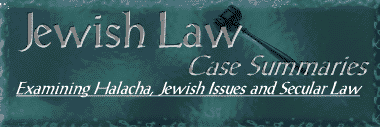

Case Summaries
-- Bet Din
Bet Din
- Isaacs v. Beth Hamedash Society
- Sunday being most convenient time for Jews to appear for Din Torah, award is not void if decision is not published until Monday, where judicial proceedings are illegal on Sunday.
1 Hilt 469 (Com.P1. 1857) aff'd 19 N.Y. 584 (1859)
- Cooper v. Weisblatt
- Din torah not an arbitration (dicta).
154 Misc. 522 (1935)
- Cabinet v. Shapiro
- Decisions of church tribunals on religious matters must be accepted by legal tribunals as final and binding.
- See this case in KASHRUT section, as well.
86 A.2d 314, 17 NJ Super 540 (1952)
- Katz v. Uvegi
- Bet Din proceedings void because were held on Sunday in violation of law and because of refusal to call witness.
- Congregation B'nei Sholom v. Martin
- Defendant reneged on $25,000 pledge towards building a synagogue; as defense claimed that should have been taken to beth din first; remanded.
382 Mich. 659, 173 N.W. 2d. 504 (S. Ct Mich. 1969)
- Kozlowski v. Seville Syndicate
- Both Din Torah and peshara may be recognized as arbitration.
314 NYS2d 439, 64 Misc2d 109 (S.Ct.N.Y. County, 1970)
- Berman v. Shatnes Lab
- Because plaintiff agreed to submit test of his qualifications to Bet Din, finding that he was not qualified was in nature of common-law award in arbitration.
- Plaintiff was not libeled by publication of Bet Din's decision.
350 NYS2d 703, 43 AD2d 736 (2 Dept, 1973)
- Davidowitz v. Dixie Assoc.
- Where plaintiff did not agree to procedure whereby other parties to dispute in which plaintiff had interest submitted dispute to Din Torah, he is not bound by decision.
351 NYS2d 34, 76 Misc2d 554 (S.Ct.N.Y. County, 1973)
- Mikel v. Scharf
- Bet Din's threat to ostracize party that did not appear before it is not coercion.
- Bet Din's refusal to allow legal representation was improper.
- Fact that Bet Din ignored established legal concepts is not misconduct.
432 NYS2d 602, 105 Misc2d 548 (S.Ct. Kings County, 1980)
- Kingsbridge Center of Israel v. Turk
469 NYS2d 732, 98 AD2d 664 (1 Dept, 1983)
- Meisels v. Uhr
145 Misc2d 571; 547 NYS2d 502 (1989); rev'd _________
- Ainsworth v. Schoen
- Trial court could not confirm arbitration award entered by religious tribunal prior to determination that award was final.
606 So.2d 1275 (Fla. 3rd Dist. 1992)
- Blitz v. Beth Isaac Adas Israel Congregation
- Affirming in part and reversing in part Circuit Court decision entering judgment by Beth Din in favor of Rabbi in employment dispute with his synagogue; noting, among other things, that Maryland courts recognize validity of arbitration proceedings of a Beth Din even when the proceeding is not in strict compliance with Maryland's Uniform Arbitration Act, as long as parties knowingly and voluntarily agreed to the Beth Din proceeding.
694 A.2d 107 (Md. Ct. Spec. App. 1997)
- Blitz v. Beth Isaac Adas Israel Congregation
- Maryland courts recognize the validity of arbitration proceedings before a Beth Din, a panel of three Rabbinic judges, even when the proceedings are not in strict compliance with the Maryland Uniform Arbitration Act, so long as the parties knowingly and voluntarily agree to the arbitration procedures; prevailing party is entitled to recover attorneys’ fees incurred both at trial and on appeal in a proceeding confirming and enforcing the arbitration award.
352 Md. 31, 720 A.2d 912 (Md. 1998), No. 72, September Term, 1997. Dated September 14, 1998. Opinion clarified December 14, 1998. Opinion by J. Bell.
- Neiman Ginsburg & Mairanz, P.C. v. Goldburd
- Plaintiff was served with a summons to appear before a Beth Din, a Jewish tribunal; plaintiff agreed to submit to the religious tribunal=s jurisdiction, but only if it would decide the dispute between plaintiff and defendant on the basis of strict Jewish law and not on the basis of a peshara@, i.e., compromise; based on his refusal to submit to its jurisdiction, the Beth Din issued a seruv@, a contempt citation which defendant published; held, (1) the publication of the seruv did not constitute libel and, in addition, N.Y. Civil Rights Law ' 74 provided defendant with a defense of truth and privilege (2) the civil courts had no jurisdiction to determine if the Beth Din=s ecclesiastical decision to issue a seruv was valid.
179 Misc. 2d 125, 684 N.Y.S.2d 405 (N.Y. Sup. Ct. 1998), Index No. 116650/97. Dated October 20, 1998. Opinion by J. Beverly S. Cohen.
Copyright © 1997-2008 by Ira
Kasdan. All rights reserved.
DISCLAIMER